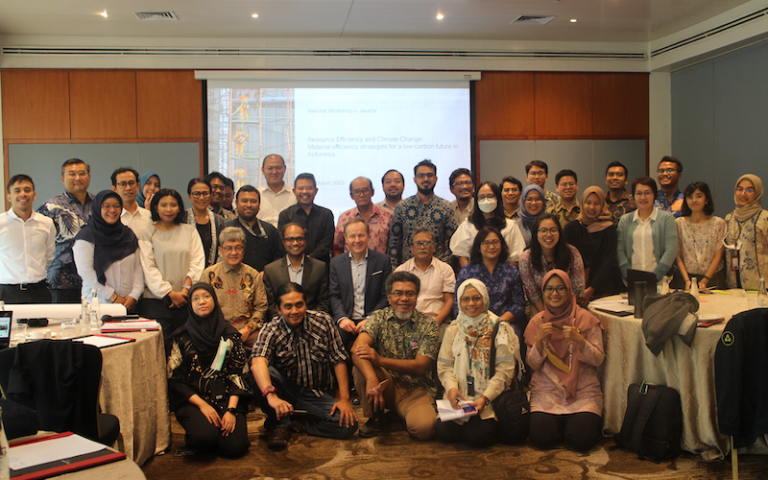The UN publishes Technical Guidelines for material efficiency in the residential construction sector
6 March 2024
UCL Energy Institute researchers Ian Hamilton and Harshavardhan Jatkar co-lead publication which identifies national priorities for material efficiency strategies and greenhouse gas emissions reduction in Argentina, Mexico, and Indonesia

Achieving greater efficiency in the use of materials for residential building construction has the potential to significantly reduce Green House Gas (GHG) emissions globally. Based on a study conducted for the countries of the G7, India and China, the International Resource Panel (IRP) of the United Nations Environment Programme (UNEP) has published a global report in 2020 titled “Resource Efficiency and Climate Change: Material Efficiency Strategies for a Low-Carbon Future (RECC)”, which aims to show how material efficiency can help reduce GHG emissions.
To contextualise the results from the global report in countries of the G20, Ian Hamilton and Harshavardhan Jatkar from the Energy Institute led the delivery of three Technical Guidelines reports for Argentina, Mexico, and Indonesia, alongside colleagues from the Norwegian Institute of Science and Technology (NTNU) and local experts. The objectives of the project were to conduct national stakeholder consultations (online and in-person) for the presentation of the main findings and recommendations of the IRP RECC report, and identification of national priorities for material efficiency strategies in the construction sector which have the potential to reduce GHG emissions.
These consultations brought together experts of the IRP, IRP Steering Committee members, the German Agency for International Cooperation (GIZ), UNEP Regional Offices and key national stakeholders including architects, engineers, representatives of the construction sector, civil society and government agencies. The stakeholders created a dynamic sector map that describes the relationship between various actors and policies currently engaged in the construction sector. Furthermore, the stakeholders generated a priority action framework, detailing the opportunities, barriers, and solutions to achieving material efficiency in the domestic construction sector. Harshavardhan Jatkar noted:
“Conducting consultative processes with key stakeholders to generate technical guidelines and policy recommendations have proven critical in identifying workable solutions in each country.
The reports present a detailed framework for action to reach a set of five goals in each country. The results were supported by modelling from Prof Edgar Hertwich and Fabio Carrer of the NTNU, highlighting the GHG emission reduction potential(s) of each of the five material efficiency strategies. The five goals identified by the IRP RECC report include: (1) Using Low-Carbon Materials; (2) Using Less Material by Design; (3) Material Decarbonisation and Substitution; (4) Decarbonisation of Manufacturing Processes; (5) Reducing Waste and Increasing Reuse and Recycling. To achieve these goals, the stakeholders highlighted the need for more information, funding, and strategic interventions if we are to increase material efficiency in the residential construction sector. Though policies for energy efficiency already exist in Argentina, Mexico, and Indonesia, the stakeholders identified the need to produce and apply policies that would increase material efficiency further, and more widely. Furthermore, the stakeholders who were consulted for the project acknowledged that those independent actors already engaged in recycling and reusing building materials are not well incorporated into material supply chains. That being so, the authors found that concerted efforts should be made to bring together actors within formal material supply chains and the informal recycling industry, to better harmonise the work of increasing material efficiency in residential construction. Ian Hamilton noted:
“By using a local stakeholder-based approach to identify priority actions and solutions, these Roadmaps can guide efforts and resources towards more effectively decarbonising the materials sector in Indonesia, Mexico and Argentina.
The Technical Guidelines for national policy apply the core conceptual frameworks of the IRP RECC report to the national priorities and circumstances of Argentina, Mexico and Indonesia, highlighting those national material efficiency strategies with the biggest potential to help reduce GHG emissions, and develop policy recommendations for the residential construction sector founded in good science. The Technical Guidelines are intended to make those specific GHG emissions reduction strategies in the three countries more relevant, and to increase their acceptance.
More about the team
Prof Ian Hamilton and Dr Harshavardhan Jatkar from the Energy Institute led the delivery of three Technical Guidelines reports for Argentina, Mexico, and Indonesia, alongside Prof Edgar Hertwich and Fabio Carrer from NTNU and local experts. The project was funded by the German Agency for International Cooperation (GIZ) and supported by United Nations Environment Programme (UNEP).
Links
- Learn more about the project – access this external webpage.
Photo credit: GIZ Indonesia
 Close
Close

